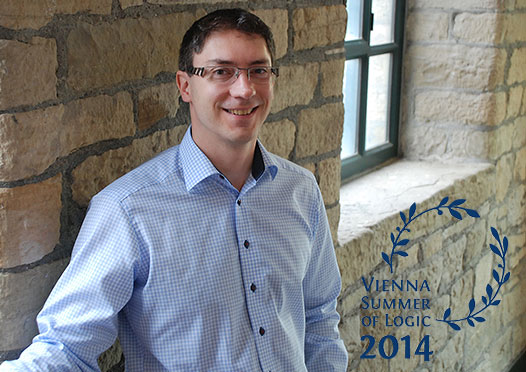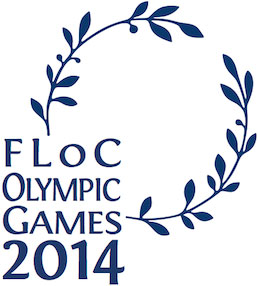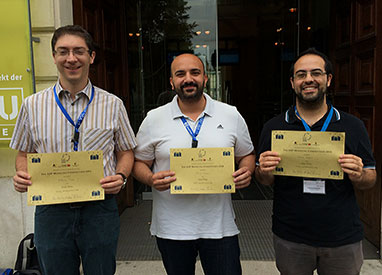Huddersfield professor becomes an Olympic champion ... of logic

Tue, 23 Sep 2014 11:32:00 BST
Professor Wolfgang Faber leads the team that took gold in the FLoC Olympics Answer Set Programming (ASP) Modelling Competition
 THE University of Huddersfield’s Professor Wolfgang Faber is a newly-crowned Olympic champion. But his mind is the muscle that brought him victory, for he is a member of a team of experts in a field of artificial intelligence who successfully took part in a major international problem-solving contest.
THE University of Huddersfield’s Professor Wolfgang Faber is a newly-crowned Olympic champion. But his mind is the muscle that brought him victory, for he is a member of a team of experts in a field of artificial intelligence who successfully took part in a major international problem-solving contest.
It is named the FLoC Olympic Games, instituted by the Federated Logic Conference, an organisation that unites thousands of the world’s leading experts in the field of computational science.
The FLoC decided to inaugurate contests on the four-yearly Olympic pattern, to include a wide variety of challenges and disciplines. The inaugural Games have now taken place in Vienna, as a component of an officially-designated Summer of Logic in the city that included 12 conferences plus numerous workshops and attracted 2,000 visitors to the Austrian capital.
Professor Faber, who joined the University of Huddersfield in 2013, assembled a team to enter the Answer Set Programming (ASP) Modelling Competition at the FLoC Olympics. He was joined by Mario Alviano and Carmine Dodaro, who had been students of his at the University of Calabria in Italy.
It proved to be a tough contest, in which the teams had 90 minutes to find solutions to five problems of varied complexity. Some were games-related and others more mathematical in nature, or required advanced computer modelling skills. Professor Faber’s team came up with the correct solutions to the same number of problems as their second-placed rivals, but clocked faster times.
The atmosphere was intense and competitive, said Professor Faber, and tactics had to be developed. The teams had one computer each and used the ASP-Core-2 input language plus a problem-solving software tool that is named Clingo.
Taking part in contests such as the FLoC Olympics can help to stimulate academic research, said Professor Faber, and the ASP Modelling Competition was one of the most challenging events on the schedule.
Answer Set Programming
 Pictured (l-r) Professor Wolfgang Faber with the rest of the winning team Mario Alviano and Carmine Dodaro.
Pictured (l-r) Professor Wolfgang Faber with the rest of the winning team Mario Alviano and Carmine Dodaro.
Answer Set Programming is central to Professor Faber’s research and teaching at the University of Huddersfield and it is an approach to computer-based problem-solving that carries many advantages in fields such as planning and scheduling.
Most computers are programmed in an “imperative” way, explains Professor Faber. Programmers tell a computer what to do in search of a solution. By contrast, ASP is “declarative”, because a computer provided with a description of the desired results and a program will work out the best way to compute them.
Among the advantages of ASP, continued Professor Faber, is the relative ease with which specifications can be changed.
“If you do a large application using the imperative paradigm, when something in your specification changes, the algorithms or the methods that you use might no longer be applicable and you might have to rewrite everything. But with the declarative paradigm, it is typically much easier to change the specification.”
- Professor Faber is Viennese-born and his academic career has included a lecturer’s post at the Vienna University of Technology, where the inaugural FLoC Olympic Games took place. In 2006 he became an Associate Professor at the University of Calabria, before relocating to the University of Huddersfield, first as a Reader and now as a Professor of Informatics. He is a member of the University’s research group named PARK, which stands for Planning, Autonomy and Representation of Knowledge and is led by Professor Lee McCluskey.







